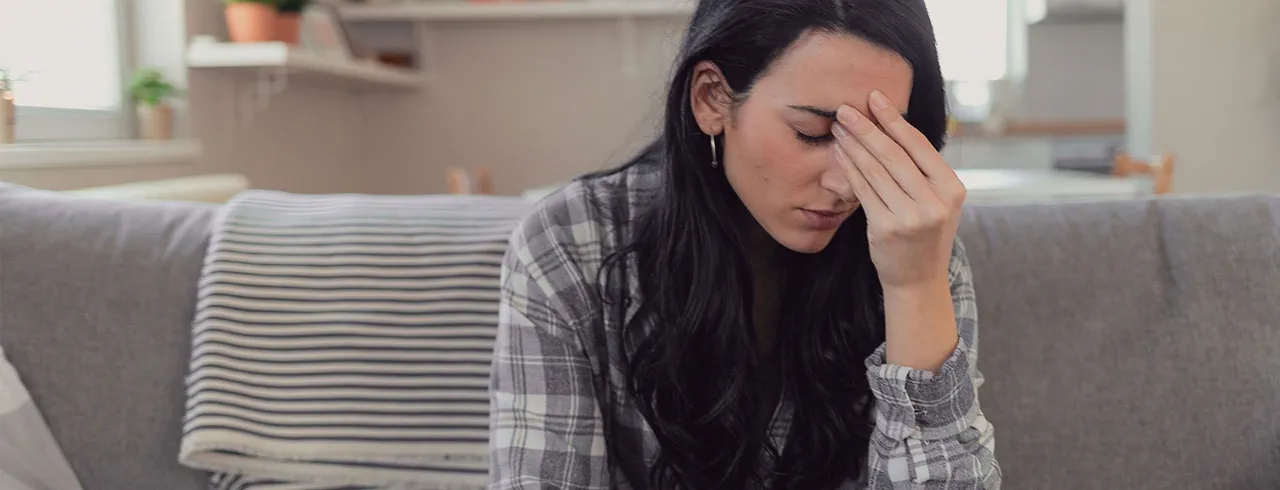
Competition
Holidays, a personal chef experience, sports gadgets and more to be wonHeadache or migraine?
Overview
- Facts and figures on headaches
- Test: tension headache or migraine?
- A headache is not always a headache
- What are the differences between tension headaches, migraines and cluster headaches?
- santé24 headache consultation hours
- Headaches – what to do and how to prevent them
- Competition for more energy: Great prizes to be won!
Facts and figures on headaches
- Tension headaches are the most common type of headache. Around 95% of the population suffer from one of these at least once in their lives.
- Women experience tension headaches slightly more often than men.
- Approximately one out of every ten people in Switzerland suffers from migraines.
- While men and women suffer from migraines in equal measure in their childhood and youth, the percentages for adults are widely different. More than two-thirds of those affected are women.
- Nearly 50% of employees working from home complain of having headaches more often. One out of five migraine sufferers experiences attacks more frequently.
A headache is not always a headache
There are more than 200 different types of headaches in total. They are divided into two categories:
- Primary headaches: a self-contained illness, no organic cause
- Secondary headaches: accompanying symptom of another illness or side effect from certain medications
Primary headaches include classic tension headaches, migraines and cluster headaches. Read on to find out more about these types of headaches.
If your head hurts, this isn't usually a cause for concern. Oftentimes the pain is harmless and subsides on its own – for example when it accompanies a cold. If you frequently suffer from headaches, if the intensity of the pain worsens, or if headache medicine isn't or stops helping, you should consult a medical expert.
Possible triggers of primary headaches
- Not enough fluids
- Stress, mental problems
- Irregular mealtimes
- Bad posture, bad work station set-up
- Noise
- Changing weather patterns
- Lack of sleep, changes in sleep/wake cycle
- Intensive sun exposure in the head area
- For women: hormonal fluctuations during the menstrual cycle
Possible triggers of secondary headaches
- Infectious diseases such as cold and flu
- High blood pressure
- Meningitis
- Stroke
- Anaemia
- Short-sightedness or long-sightedness that is not being properly corrected
- Metabolic disturbances such as diabetes
- Head injuries such as concussion
- Medicine such as hormone drugs or pain, heart, blood pressure and virility medication
What are the differences between tension headaches, migraines and cluster headaches?
Migraines and cluster headaches
What you need to know about migraines
A brief explanation of cluster headaches

SWICA offers its customers support with headaches
With its headache consultation hours, santé24 now offers SWICA customers targeted specialist medical advice and/or therapy for chronic, recurrent headaches or migraines.
Find out more about headache consultation hours
santé24 – your Swiss telemedicine service
Phone +41 44 404 86 86
Headaches – what to do?
Natural first aid remedies
- Peppermint oil has a relaxing effect and promotes circulation. It also contains cooling menthol which blocks pain signals. Put a few drops of peppermint oil on your temples or forehead.
- If you have a moderate headache then tea made of lavender flowers is soothing and antispasmodic. Lavender oil has a stronger effect. Rub two or three drops of it on your upper lip and breathe in the fragrance for about 15 minutes. Or put a towel that has been daubed with lavender oil on your forehead.
- Lemon balm in the form of a spirit can alleviate headaches. You can put a compress on your forehead or neck, or ingest the drops directly.
- Ginger tea with a bit of lemon juice promotes circulation in the brain. You can either chew ginger root or grate some ginger and mix it with a glass of fruit juice.

Other tips
- A short walk in the fresh air relaxes you and promotes circulation.
- Stretching and limbering-up exercises can loosen tension in your neck and shoulders, which often triggers tension headaches. A warm bath is also relaxing.
- In addition to heat, cold can also alleviate headaches. Apply a wet wash cloth or a cool pack to your forehead for a few minutes.
- Practice using your fingers to exert light pressure on the areas that ache for around 30 seconds. Repeat this temple massage as often as you like. Or massage the top part of your nose between your eyes.
How to prevent headaches
- Drink enough liquids, preferably unsweetened drinks such as water, tea or juice mixed with sparkling water.
- Maintain a balanced diet and eat regularly. This keeps your blood sugar level stable.
- Regularly incorporate movement into your daily/weekly routine with 3x30 minutes of endurance exercise (jogging, swimming, rowing, cycling), preferably out in the fresh air.
- Lower your stress, for example with progressive muscle relaxation or yoga (3x30 minutes/week).
- Make sure that you're getting enough sleep.
SWICA offers support with personal headache advice as well as over 100 courses and treatments
SWICA offers its customers round-the-clock medical assistance from the santé24 telemedicine service: The doctors and medical specialists at santé24 are available to you 24 hours a day, 365 days a year to answer all of your questions on prevention, illness, accident and maternity. Advice is free of charge to SWICA customers. For example, with its headache consultation hours, santé24 provides SWICA customers with targeted specialist advice and/or therapy for chronic, recurrent headaches or migraines.
santé24 – your Swiss telemedicine service
24/7 phone line: +41 44 404 86 86
Up to 1'300 francs* for preventive services each year
A healthy lifestyle can help prevent physical issues such as headaches – which is why SWICA offers its supplementary insurance customers up to 1'300 francs each year (*find out more) for a wide range of relaxation, wellbeing and exercise activities such as qigong, yoga, tai chi, personal trainers, fitness, mindfulness courses and much more. Supplementary insurance is also always a valuable add-on to your basic insurance, and you can purchase a plan from SWICA at any time, regardless of which insurer currently provides your basic insurance.
SWICA – Because health is everything
Being active pays off. SWICA – unlike many other health insurance companies – supports your personal commitment through a wide range of activities and offers relating to health promotion and preventive healthcare. Whether it's yoga, tai chi, fitness classes, swimming lessons, breathing exercises, personal training, nutritional advice, mindfulness training, tennis or one of the other available options, you enjoy attractive contributions of up to 1'300 francs* per year from the COMPLETA FORTE, COMPLETA PRAEVENTA and OPTIMA supplementary insurance plans (*see detailed information).
Incidentally, supplementary insurance always provides valuable additional benefits above and beyond those available under basic insurance. It can be taken out with SWICA at any time, regardless of which insurer currently provides your basic insurance.
Personal consultation
Would you like more information or a personal consultation? SWICA Client Services would be happy to assist. Call us on +41 58 800 99 33 or send us a message using the contact form below.
Request a personal consultation




